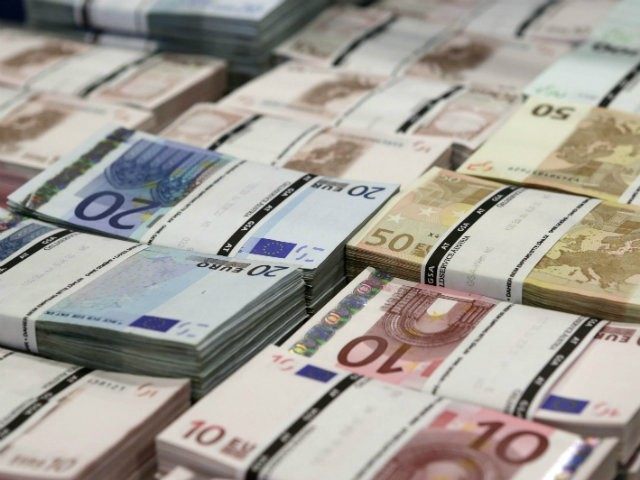Perhaps Greece’s new far-left government will rethink its plans to shake Europe down for cash to fund its wild spending binges, now that the German economy has officially entered a deflationary cycle, as reported by Business Insider:
Germany’s consumer price index fell 0.3% month-over-month in January.
It’s the first time the inflation rate went negative since September 2009.
“Deflation has arrived,” Pantheon Macroeconomics’ Claus Vistesen said.
Deflation is a very scary phenomenon. When prices fall, consumers and businesses often hold back on purchases hoping for even lower prices. Economic activity seizes and prices continue to fall in a self-reinforcing cycle.
Germany’s negative CPI number was largely due to the ongoing plunge in energy prices, which were down 9.9% year-over-year.
But other price are slowing or dropping, too.
“The decline in food prices also accelerated to -1.3% in January from -1.2% in December,” Vistesen noted. “Services inflation fell to 1.2% from 1.4% last month and rents declined to 1.3% year-over-year from 1.4% last month.”
Just kidding about the Greeks — socialists don’t care about the travails of the “rich” people and nations they squeeze for money. Germans, however, might feel a bit grumpy about the burden they’re expected to carry, while Europe will not be pleased at such a murmur in its economic heart. The overall Eurozone slipped into 0.6% deflation in January, a record low in the 15-year history of the European Union — as bad as the deflation which followed the 2008 financial crisis. Spain was hardest-hit, with a 1.5% drop. As Business Insider notes, this is bad news for the debt-heavy nations of the EU, because “when a euro is worth more tomorrow than it is today, any debts you make in euros are effectively growing.”
Only two weeks ago, Germany’s deputy finance minister, Steffen Kampeter, told CNBC there was no risk of a deflationary spiral, and the German economy was “growing beyond expectations.” It will take some time to learn if the deflationary dip for both Germany and the Eurozone is more than just a slightly worse version of the “moderate and negative price development” Kampeter anticipated.
A note of pessimism seeps into the Financial Times report:
The plunge was almost entirely down to the collapse in oil prices, with energy costs falling by 9 per cent over the 12 months. The last time prices fell in the eurozone’s largest economy was in September 2009 and the latest dip all but confirms that deflation across the currency area worsened in January.
Analysts polled by Bloomberg expect figures to be released on Friday by Eurostat, the European Commission’s statistics agency, to show prices fell by 0.5 per cent in January. With German prices falling at a faster pace than expected, the eurozone figure could undershoot forecasts.
“[The German inflation figure] means expectations for eurozone inflation now carry a decidedly downside risk,” said Jörg Krämer, chief economist at Commerzbank. “The drop in oil prices suggests that eurozone headline inflation should stay below the zero line until autumn.”
The Financial Times argues that the deflation report supports the case for “last week’s landmark quantitative easing package from the European Central Bank,” which was opposed by the German members of the ECB. Their argument was that Germany should reduce its debt, rather than buying up debt to flood the market with easy money, which they felt would tempt European Union nations to spend more money they don’t really have… a temptation they were noticeably more confident Germany would be able to resist than its EU colleagues.
German policymakers seem generally surprised that their economy joined the rest of the Eurozone in deflation. They’re not alone in their bewilderment, as just two months ago, ECB officials were confidently predicting that the rest of the Eurozone would avoid the deflationary spiral that ended up greeting them at the dawn of the new year. The problem for the rest of Europe is that Germany is far better positioned to deal with the problem.
In fact, the Financial Times wonders if the end result might be Europe’s loss and Germany’s gain: “While the German economy is strong enough to weather a spell of falling prices, deflation threatens to create havoc in weaker members of the currency area. The plunge in oil prices is likely to boost consumers’ spending on other goods and services in relatively strong economies such as Germany’s, where unemployment is at a post-unification low. The danger for the eurozone is that in weaker parts of the region, deflation will lead consumers to delay purchases, weighing on already anemic demand.”
For an illustration of what they’re talking about, consider that German unemployment is at record lows at the same moment that Italian unemployment is hitting record highs. Germany entered the 2014 holiday season confident that it had found a sweet spot of moderate inflation, rising wages, a strong labor market, and healthy consumer demand.
The Economist tried raining on their parade in an October article warning that the Eurozone’s inability to get its act together on fiscal policy left “a region that makes almost a fifth of world output marching toward stagnation and deflation,” as the expectation of falling prices led to reduced spending and loan defaults.” The predicted result: “As debt burdens soar from Italy to Greece, investors will take fright, populist politicians will gain ground, and – sooner rather than later – the euro will collapse.” From the vantage point of late January 2015, that warning looks more prescient than whatever Europe’s central bankers were expecting to happen.

COMMENTS
Please let us know if you're having issues with commenting.